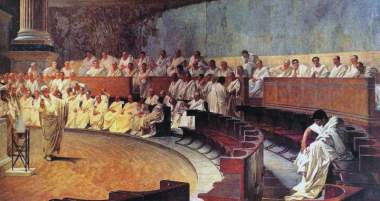 The New American
The New American
by William F. Jasper
5/14/2018
Excerpt:
“A nation can survive its fools and even the ambitious, but it cannot survive treason from within,” the great Roman statesman Cicero opined before the Senate. That warning is as applicable today as it was 2,000 years ago.
In 1965, best-selling historical novelist Taylor Caldwell published her great work on Marcus Tullius Cicero, A Pillar of Iron. A central focus of her meticulously researched study was Cicero’s political combat with, and triumph over, the treasonous conspiracy led by Roman Senator Lucius Sergius Catilina, known in English as Catiline. While Rome’s wealthiest and ablest citizens timidly evaded their duties to defend the commonweal against the impending mortal danger, Cicero, the incomparable rhetoretician, aided by Cato the Younger, dauntlessly exposed and opposed the Catiline conspiracy, which had penetrated all levels of the government. Prominent senators and aristocrats in the conspiracy included Lentulus, Cethegus, Longinus, and Paetus.
“A nation can survive its fools and even the ambitious, but it cannot survive treason from within,” Caldwell records Cicero declaiming before the Senate, in A Pillar of Iron. “An enemy at the gates is less formidable, for he is known and he carries his banners openly against the city. But the traitor moves among those within the gates freely, his sly whispers rustling through all alleys, heard in the very halls of government itself. For the traitor appears no traitor; he speaks in the accents familiar to his victim, and he wears their face and their garments and he appeals to the baseness that lies deep in the hearts of all men.
……………………………………………………..
View the complete article including image and comments at:










